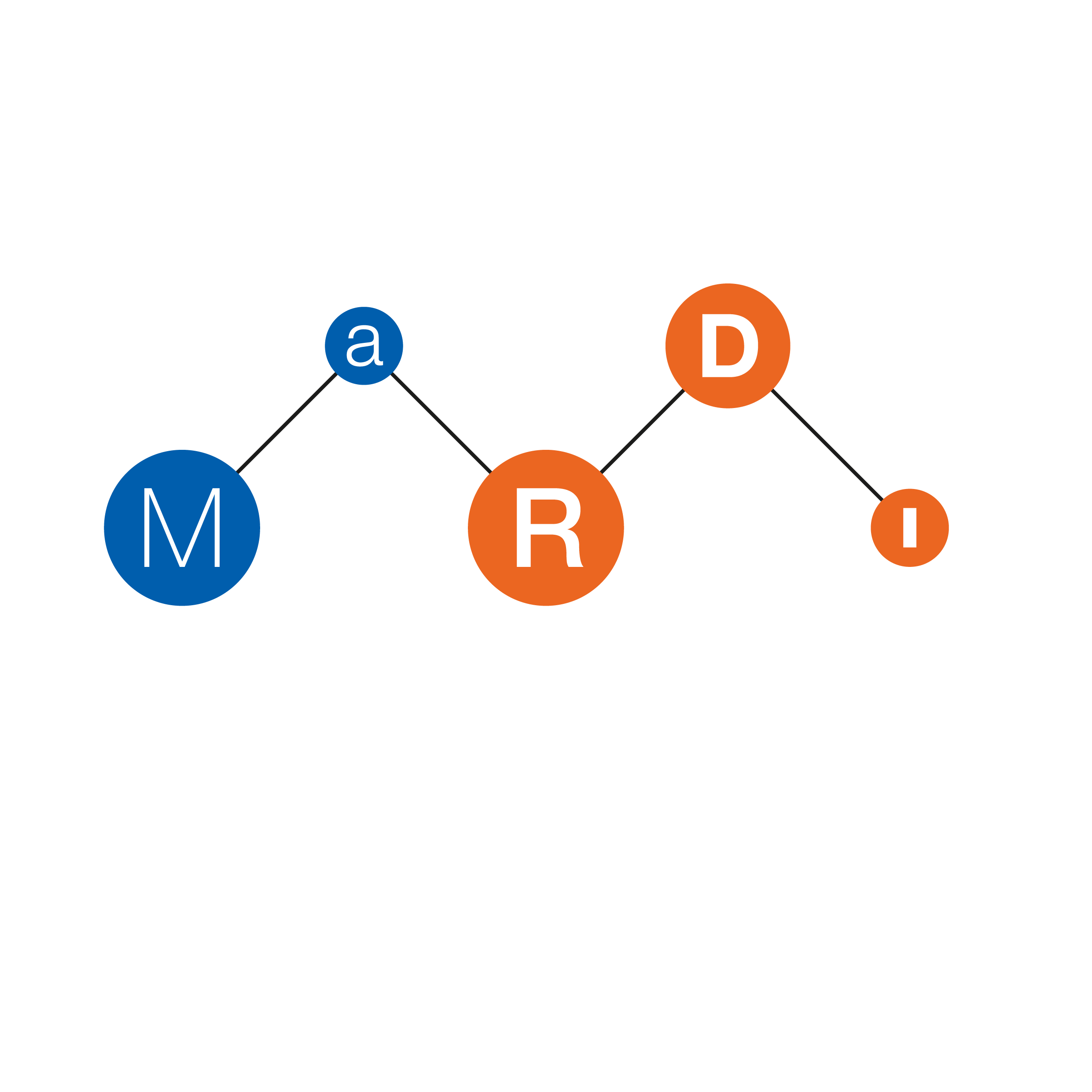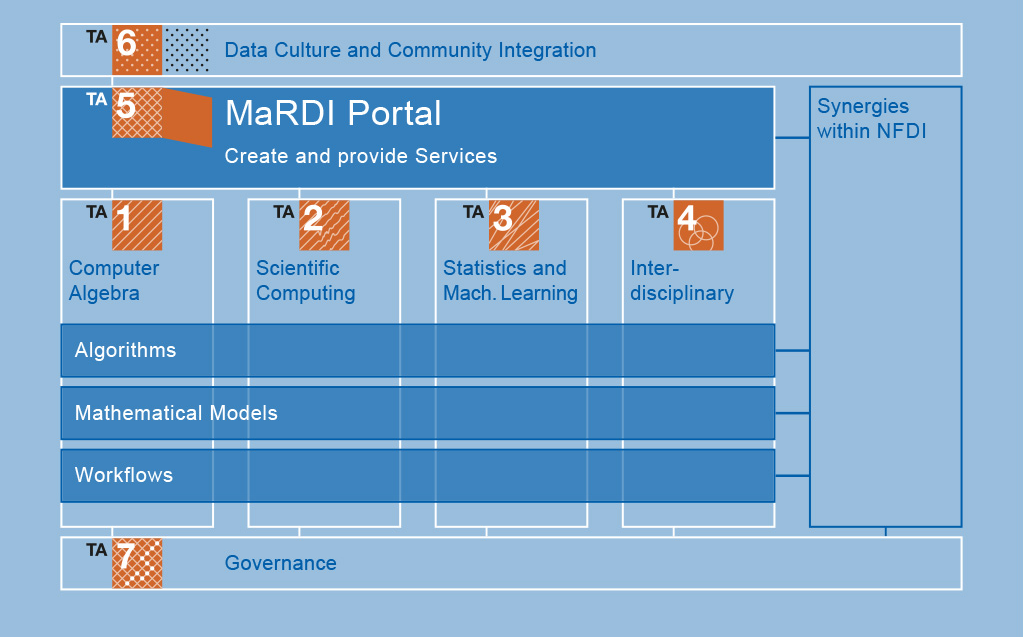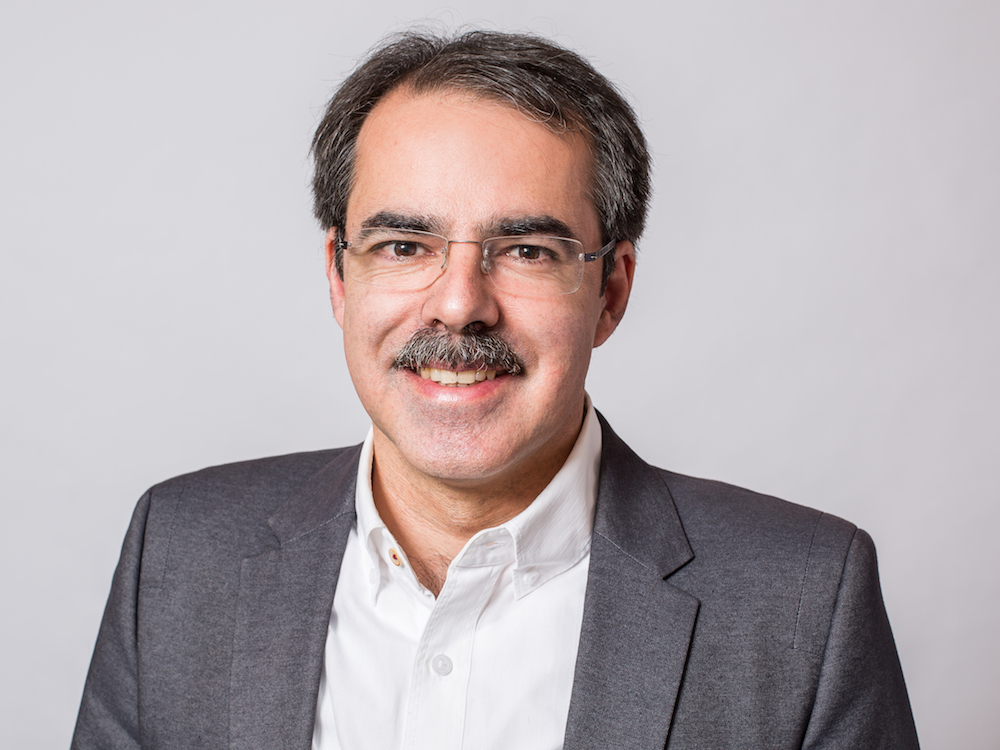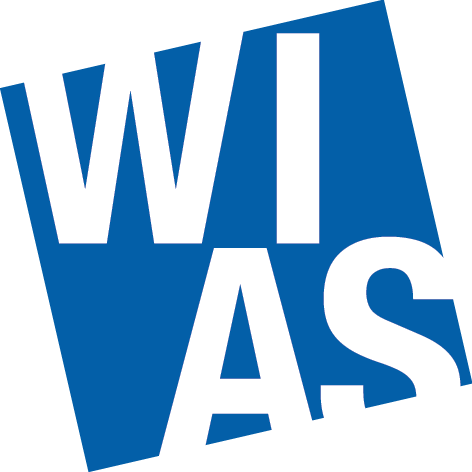
About us
Driven by the needs and requirements of mathematical research as well as scientific disciplines using mathematics, the NFDI-consortium MaRDI (Mathematical Research Data Initiative) will develop and establish standards and services for mathematical research data.
Mathematical research data ranges from databases of special functions and mathematical objects, aspects of scientific computing such as models and algorithms to statistical analysis of data with uncertainties. It is also widely used in other scientific disciplines due to the cross-disciplinary nature of mathematical methods. The handling of research data in mathematics raises questions on the reproducibility of results, reusability and access to data. However, existing solutions are often specific to the question at hand, resulting in the general lack of a comprehensive data culture and corresponding infrastructure for mathematical research data that support the research process and implement the FAIR principles.
Starting with the areas of computer algebra, scientific computing, statistics and machine learning, MaRDI will develop standards for confirmable workflows and certifiable mathematical results and provide new services that assist the research cycle up to peer-review in the publication process.
Furthermore, by building the MaRDI portal as a decentralized and federated infrastructure the storage and accessing of data and knowledge will be facilitated in a manner that would perpetuate FAIR and open science principles.
Goals
- Develop the interoperability of mathematical research data from symbolic, exact, numeric and uncertain data, benchmark data, equations to mathematical models.
- Standardise semantic annotations for mathematical objects, algorithms, models, software and other data enabling interdisciplinary use.
- Certify results from exact or numerical computations and computational experiments.
- Establish confirmable workflows for computer-aided mathematics, scientific computing, statistics and machine learning.
- Set up of the MaRDI portal for mathematical research data, as decentralised and federated data repositories and knowledge bases.
- Create guidelines for the peer-review process to ensure the correctness of calculations with mathematical software.
- Develop and foster a data culture that recognises mathematical research data to be a citable result in its own right.
Task Areas


Prof. Dr. Michael Hintermüller
Speaker of the consortium
(Co-)applicant institutions and (co-)speakers:
- Prof Ilka Agricola — German Mathematical Society
- Prof Peter Benner — Max Planck Institute for Dynamics of Complex Technical Systems Magdeburg
- Prof Bernd Bischl — Ludwig Maximillian University of Munich
- Prof Wolfram Decker — Technical University of Kaiserslautern
- Prof Mathias Drton — Technical University of Munich
- Prof Claus Fieker — Technical University of Kaiserslautern
- Prof Dominik Gödekke — University of Stuttgart
- Prof Michael Joswig — Technical University of Berlin
- Prof Stephan Klaus — Oberwolfach Research Institute for Mathematics
- Prof Mario Ohlberger — University of Münster
- Prof Harald Sack— FIZ Karlsruhe – Leibniz-Institute for Information Infrastructure
- Prof Anita Schöbel — Fraunhofer Institute for Industrial Mathematics (ITWM)
- Prof Christof Schütte — Zuse Institut of Berlin
- Prof Rainer Sinn — University of Leipzig
- Prof Bernd Sturmfels — Max Planck Institute for Mathematics in the Sciences

Weierstrass Institute for Applied Mathematics and Statistical Analysis
Applicant institution
Participating Institutions
- European Mathematical Society
- Association of Applied Mathematics and Mechanics
- German Operations Research society e.V
- IMAGINARY gGmbH
- Dr. Peter Bastian — Cluster of Excellence “STRUCTURES: A unifying approach to emergent phenomena in the physical world, mathematics, and complex data” (EXC 2181), Ruprecht Karl University of Heidelberg
- Dr. Martin Skutella — Cluster of Excellence MATH+ (EXC 2046), Technical University of Berlin
- Dr. Thomas Ertl — Cluster of Excellence “Data-integrated Simulation Science” (EXC 2075), University of Stuttgart
- Dr. Dieter Fellner — Fraunhofer Information and Communication Technology Group ICT
- Dr. Bettina Eick — Technical University of Braunschweig
- Dr. Michael Kohlhase — Friedrich-Alexander University of Erlangen-Nuremberg

Prof. Dr. Michael Hintermüller
Speaker of the consortium

Weierstrass Institute for Applied Mathematics and Statistical Analysis
Applicant institution
(Co-)applicant institutions and (co-)speakers:
- Prof Ilka Agricola— German Mathematical Society
- Prof Peter Benner— Max Planck Institute for Dynamics of Complex Technical Systems Magdeburg
- Prof Bernd Bischl— Ludwig Maximillian University of Munich
- Prof Wolfram Decker— Technical University of Kaiserslautern
- Prof Mathias Drton— Technical University of Munich
- Prof Claus Fieker— Technical University of Kaiserslautern
- Prof Dominik Gödekke— University of Stuttgart
- Prof Michael Joswig— Technical University of Berlin
- Prof Stephan Klaus— Oberwolfach Research Institute for Mathematics
- Prof Mario Ohlberger— University of Münster
- Prof Harald Sack— FIZ Karlsruhe -Leibniz-Institute for Information Infrastructure
- Prof Anita Schöbel— Fraunhofer Institute for Industrial Mathematics (ITWM)
- Prof Christof Schütte— Zuse Institut of Berlin
- Prof Rainer Sinn— University of Leipzig
- Prof Bernd Sturmfels— Max Planck Institute for Mathematics in the Sciences
Participating Institutions
- European Mathematical Society
- Association of Applied Mathematics and Mechanics
- German Operations Research society e.V
- IMAGINARY gGmbH
- Dr. Peter Bastian — Cluster of Excellence “STRUCTURES: A unifying approach to emergent phenomena in the physical world, mathematics, and complex data” (EXC 2181), Ruprecht Karl University of Heidelberg
- Dr. Martin Skutella — Cluster of Excellence MATH+ (EXC 2046), Technical University of Berlin
- Dr. Thomas Ertl — Cluster of Excellence “Data-integrated Simulation Science” (EXC 2075), University of Stuttgart
- Dr. Dieter Fellner — Fraunhofer Information and Communication Technology Group ICT
- Dr. Bettina Eick — Technical University of Braunschweig
- Dr. Michael Kohlhase — Friedrich-Alexander University of Erlangen-Nuremberg